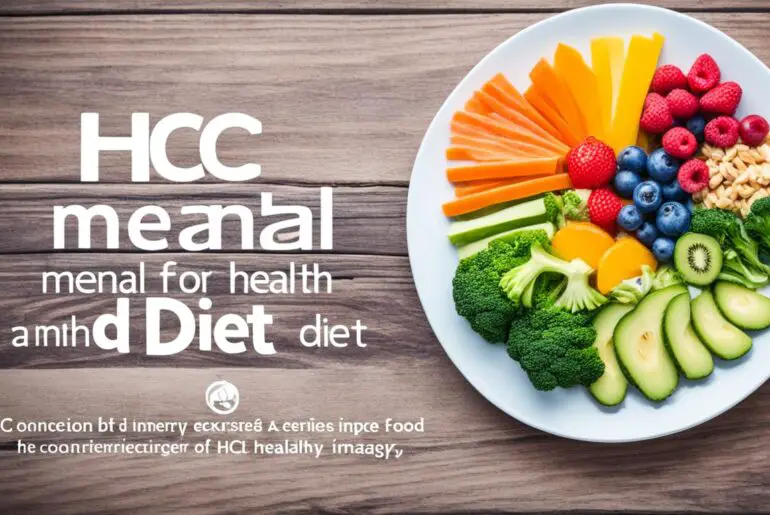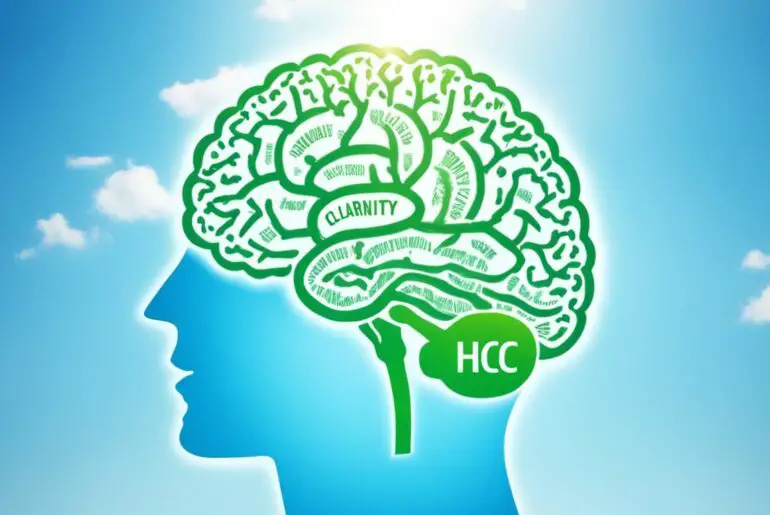Did you know that millions of people around the world have tried the HCG diet in pursuit of rapid weight loss and improved emotional well-being? However, the controversial diet and its claims of mood enhancement have left many skeptical.
Despite its popularity, there is no scientific evidence to support the notion that the HCG diet improves mood or emotional stability. The promise of fast weight loss without hunger may be alluring, but it is important to understand the potential risks and limitations of this extreme diet.
Key Takeaways:
- HCG diet claims to enhance mood and emotional stability but lacks scientific evidence to support these claims.
- The HCG diet’s primary mechanism for weight loss is extreme calorie restriction, not the HCG hormone itself.
- Consulting with healthcare professionals and exploring alternative weight loss methods is crucial for safe and sustainable results.
- Behavior change and long-term lifestyle adjustments are key for successful and lasting weight loss.
- Taking a comprehensive approach to weight loss, including nutrition and physical activity, is essential for overall well-being.
Understanding hCG and its Function in the Body
The hCG hormone, also known as human chorionic gonadotropin, is a hormone that is produced at high levels during early pregnancy. Its primary function is to maintain hormone production and support the growth of the uterus and fetus. After the first 3 months of pregnancy, blood levels of hCG decrease.
Aside from its role in pregnancy, hCG has also been used to treat fertility issues. Elevated levels of hCG may indicate certain types of cancer, making it a valuable diagnostic tool in some cases.
The hCG diet utilizes the hCG hormone in combination with a low-calorie diet to achieve rapid weight loss.
The hCG diet is a weight loss program that incorporates the use of hCG hormone injections or supplements. This diet combines the hormone with a very low-calorie intake, usually around 500-800 calories per day. The theory behind this diet is that hCG can help suppress hunger and promote fat loss.
However, it is important to note that there is no scientific evidence to support the effectiveness of the hCG diet for weight loss or its impact on hormone production in individuals who are not pregnant. The weight loss achieved on the hCG diet is primarily due to the drastic calorie restriction rather than the hCG hormone itself.
The Role of hCG in Pregnancy
During pregnancy, hCG supports the production of other hormones, such as progesterone and estrogen, which are essential for maintaining a healthy pregnancy. It also helps stimulate the growth of the uterus and plays a role in preventing the breakdown of the uterine lining, ensuring a favorable environment for the developing fetus.
hCG and Fertility Treatment
hCG is commonly used in fertility treatments to stimulate ovulation. It can be administered as an injection or through other methods to help women who are having trouble getting pregnant. By mimicking the hormone’s natural role in pregnancy, fertility specialists can induce the release of eggs from the ovaries and increase the chances of conception.
Risks and Side Effects
While hCG is generally considered safe when used under medical supervision, it is essential to consult with a healthcare professional before considering any hormone-based weight loss program, including the hCG diet. Like any medical intervention, there are potential risks and side effects that need to be carefully considered.
The Effect of the hCG Diet on Weight Loss

Proponents of the hCG diet claim that the hormone boosts metabolism and facilitates significant fat loss without hunger. However, studies have consistently shown that the weight loss achieved on the hCG diet is solely due to the drastic calorie restriction and not the hCG hormone itself.
Several studies comparing hCG injections to placebo injections found no significant difference in weight loss between the two groups. Additionally, hCG has been shown to be ineffective in reducing hunger.
Calorie restriction and weight loss: The primary driver of weight loss on the hCG diet is the severe calorie restriction. By consuming only around 500 calories per day, the body is unable to obtain enough energy from food and is forced to use its fat stores for fuel, resulting in weight loss.
“The weight loss achieved on the hCG diet is primarily due to the extreme calorie restriction and not the hCG hormone itself.”
- Effectiveness of hCG in reducing hunger: Despite claims that hCG reduces hunger, scientific studies have shown otherwise. Hunger is primarily driven by the body’s response to calorie restriction, and hCG does not appear to have any appetite-suppressing properties.
- hCG and metabolism: Some proponents of the hCG diet believe that the hormone can boost metabolism and promote fat burning. However, there is no scientific evidence to support these claims. The significant weight loss observed on the hCG diet is primarily due to the body’s adaptation to the severe calorie restriction, not any direct effect of hCG on metabolism.
While the hCG diet may result in rapid weight loss, it is important to note that this weight loss is not sustainable in the long term. Severely restricting calories can lead to muscle loss, metabolic slowdown, and nutrient deficiencies, which can have adverse effects on overall health and well-being.
Alternative weight loss methods that focus on balanced nutrition, regular physical activity, and behavior change offer a more sustainable approach to weight management. Consulting with healthcare professionals, such as registered dietitians or physicians, can help develop personalized and evidence-based weight loss plans.
Impact of the hCG Diet on Body Composition
The hCG diet is known for its drastic calorie restriction, typically limiting intake to around 500 calories per day. While it may promise rapid weight loss, there are concerns regarding its impact on body composition, specifically muscle mass and metabolism.
One common side effect of rapid weight loss diets, including the hCG diet, is muscle loss. When the body is not receiving an adequate amount of calories, it begins to break down muscle tissue for energy. This can result in a decrease in muscle mass and a less toned appearance.
Additionally, the extreme calorie restriction of the hCG diet can lead to a metabolic slowdown. When the body is consistently receiving very low levels of energy, it adapts by reducing energy expenditure. This can cause a decrease in the metabolic rate, making weight loss more challenging and potentially leading to weight regain in the long term.
Despite claims by proponents of the hCG diet that it prevents muscle loss and stimulates anabolic processes, there is currently no scientific evidence to support these claims. The focus of the diet is primarily on calorie restriction rather than muscle preservation.
The Importance of Preserving Muscle Mass
Maintaining muscle mass is crucial for overall health and weight management. Muscle tissue is metabolically active, meaning it burns more calories at rest compared to fat tissue. Therefore, having more muscle can help increase the metabolic rate and support healthy weight management.
Furthermore, having a higher muscle mass can improve physical performance, promote better balance and stability, and enhance overall body composition. It can also help prevent age-related muscle loss, which is common as we get older.
Therefore, if weight loss is a goal, it is important to prioritize strategies that preserve muscle mass. This can be achieved through a combination of resistance training exercises, consuming adequate protein, and ensuring a balanced and nutrient-rich diet.
To summarize, while the hCG diet may result in rapid weight loss, it can negatively impact body composition by leading to muscle loss and a metabolic slowdown. Preserving muscle mass should be a priority when aiming for sustainable and healthy weight management.
| Pros | Cons |
|---|---|
| – Rapid weight loss | – Muscle loss |
| – Potential short-term results | – Metabolic slowdown |
| – Possible initial motivation boost | – Lack of scientific evidence |
The Rules of the hCG Diet
The hCG diet follows a structured approach that consists of three phases: the loading phase, the weight loss phase, and the maintenance phase. Each phase has specific guidelines and recommendations to ensure optimal results.
Loading Phase
The loading phase, also known as the “gorging” phase, lasts for two days. During this phase, individuals are encouraged to consume high-calorie foods to build up fat reserves in preparation for the next phase. This phase helps kickstart the body’s metabolism and ensures a smoother transition into the calorie-restricted phase.
Weight Loss Phase
The weight loss phase is the most crucial part of the hCG diet and typically lasts for 3-6 weeks, depending on individual goals. During this phase, the calorie intake is restricted to around 500 calories per day. The meal plan primarily consists of lean proteins, vegetables, bread, and fruit. It’s essential to avoid oils, butter, and sugar while focusing on hydration by consuming water, mineral water, coffee, and tea. This phase is where the most significant weight loss occurs.
Maintenance Phase
After completing the weight loss phase, individuals enter the maintenance phase. This phase aims to stabilize the weight loss and transition back to a more regular diet. Calorie intake gradually increases but remains controlled, usually ranging from 800 to 1500 calories per day. Healthy food choices, portion control, and regular exercise play critical roles during this phase to maintain the achieved weight loss.
The duration of each phase may vary depending on individual needs and goals. It’s essential to consult with a healthcare professional or a registered dietitian before starting the hCG diet to ensure it aligns with your health condition and provides proper guidance throughout the process.
| Phase | Description |
|---|---|
| Loading Phase | Two days of consuming high-calorie foods to build up fat reserves |
| Weight Loss Phase | Calorie intake restricted to around 500 calories per day; lean proteins, vegetables, bread, and fruit |
| Maintenance Phase | Gradual increase in calorie intake (800-1500 calories per day); focus on portion control and healthy food choices |
Scam Products on the Market
When it comes to hCG diet products, it’s important to be aware of the scams and misleading claims that exist in the market. Many products labeled as “homeopathic hCG” are not genuine hCG products and do not contain any real hCG hormone. These products often make false promises of weight loss and can deceive individuals who are seeking effective solutions.
Genuine hCG, which is administered as a fertility drug or hormone treatment, is only available with a doctor’s prescription. These prescribed hCG products undergo strict regulations and quality control measures to ensure their safety and efficacy. It’s crucial to consult with healthcare professionals before considering any hCG product.
The U.S. Food and Drug Administration (FDA) has raised concerns about the safety and efficacy of hCG diet products available without a prescription. These products are unregulated and may contain unknown ingredients, posing risks to consumers. The FDA has not approved hCG as a weight loss aid and has issued warnings against using hCG diet products without proper medical supervision.
It’s important to be cautious and skeptical of any hCG product that claims to provide rapid weight loss without adequate scientific evidence. Prioritizing your safety and well-being is essential when considering any weight loss program or product.
Safeguard yourself from scam products that masquerade as homeopathic hCG and do not deliver the intended results. Always consult with healthcare professionals and make informed decisions for your weight loss journey.
| Scam Products on the Market | Real hCG Products |
|---|---|
| Labelled as “homeopathic hCG” | Genuine hCG administered as a fertility drug or hormone treatment |
| Do not contain any real hCG hormone | Available with a doctor’s prescription |
| Unregulated and may contain unknown ingredients | Undergo strict regulations and quality control measures |
| Pose risks to consumers | Prescribed and monitored by healthcare professionals |
| No scientific evidence for efficacy | Backed by scientific research and medical expertise |
Remember, your health and safety should always be the top priority. Consultation with healthcare professionals is crucial before embarking on any weight loss program or using hCG products. Be cautious of scams and prioritize evidence-based approaches to achieve your health goals.
Safety and Side Effects of the hCG Diet
The hCG diet has gained popularity as a quick weight loss solution, but it is crucial to consider the safety and potential side effects associated with this controversial diet. The FDA has warned against using hCG diet products and has not approved hCG as a weight loss aid.
The main concern with the hCG diet is the severe calorie restriction it imposes. Consuming only 500 calories per day can lead to nutrient deficiencies and potential health risks. These risks include headaches, depression, fatigue, and even blood clots. In fact, a case study reported complications, including blood clots, in a woman following the hCG diet.
It is essential to consult with healthcare professionals before considering the hCG diet. They can provide personalized guidance and determine if the diet is suitable for your specific health needs. Consulting with healthcare professionals will help you make informed decisions about your weight loss journey and ensure your safety and well-being.
Key Takeaways:
- The FDA has issued warnings against using hCG diet products.
- Severe calorie restriction on the hCG diet can lead to nutrient deficiencies and potential health risks.
- Potential side effects of the hCG diet include headaches, depression, fatigue, and blood clotting.
- Consulting with healthcare professionals is crucial before considering the hCG diet.
The Bottom Line on the hCG Diet
The hCG diet is touted as an extreme weight loss method that restricts calorie intake to a mere 500 calories per day. While it may lead to rapid weight loss, it’s important to note that this is primarily due to the severe calorie restriction rather than the hCG hormone itself. There is no scientific evidence to support the claims that the hCG diet improves mood or emotional well-being.
If you’re looking for a sustainable and healthy approach to weight loss, it’s recommended to explore alternative methods that prioritize long-term success and overall well-being. Consultation with healthcare professionals can provide personalized guidance and support in developing an effective weight loss plan.
Effective Weight Loss
When it comes to achieving sustainable weight loss, there are several factors to consider. It’s important to prioritize a balanced diet that includes nutrient-rich foods and promotes portion control. Regular physical activity is also crucial for burning calories and improving overall fitness.
In addition to diet and exercise, behavior change plays a significant role in successful weight loss. It’s essential to develop healthy habits and make long-term lifestyle changes that support your weight loss goals. This may involve seeking support from registered dietitians, fitness professionals, or behavioral therapists.
Healthy Weight Loss Methods
Healthy weight loss should focus on gradual progress rather than quick fixes. Crash diets or extreme measures, like the hCG diet, can be detrimental to your overall health and well-being. Instead, opt for a balanced approach that combines a nutritious diet with regular exercise.
Here are some healthy weight loss strategies to consider:
- Focus on whole, unprocessed foods that are rich in nutrients and low in calories.
- Eat a variety of fruits, vegetables, lean proteins, whole grains, and healthy fats.
- Practice portion control and mindful eating to prevent overeating.
- Incorporate regular physical activity into your routine, such as brisk walking, cycling, or strength training.
- Stay hydrated by drinking plenty of water throughout the day.
- Get adequate sleep to support your overall health and weight management goals.
Alternative Weight Loss Approaches
If you’re looking for alternative weight loss approaches, there are numerous options available that prioritize sustainability and long-term success. Some popular approaches include:
- The Mediterranean diet: A plant-based eating plan that emphasizes whole foods, lean proteins, healthy fats, and moderate portions.
- The DASH diet: A dietary pattern designed to lower blood pressure, focusing on fruits, vegetables, whole grains, lean proteins, and low-fat dairy products.
- The Weight Watchers program: A structured weight loss program that focuses on a balanced diet, portion control, and support from peers and professionals.
- The ketogenic diet: A low-carb, high-fat diet that puts your body into a state of ketosis, resulting in enhanced fat burning.
It’s important to find an approach that suits your individual needs and preferences. Consulting with healthcare professionals, such as registered dietitians or physicians, can guide you in selecting a safe and effective weight loss method.
Introduction of Dr. Maria Maricich’s Program

Dr. Maria Maricich has developed an innovative solution for individuals looking to achieve their weight loss goals in a safer and more sustainable way. Introducing Dr. Maria’s WeightLoss Works Program, a modified version of the controversial hCG diet that aims to deliver effective results while prioritizing your health and well-being.
Dr. Maria’s WeightLoss Works Program offers a modified approach to the hCG diet, addressing the concerns surrounding its safety and potential risks. This program provides individuals with a more flexible and manageable diet plan, allowing for a higher calorie intake of 800-1000 calories per day.
The main objective of Dr. Maria’s program is to make weight loss more attainable and long-lasting, utilizing functional medicine and holistic approaches. The program consists of distinct phases, including preparation, fat loading, calorie restriction, and maintenance. Each phase is carefully designed to maximize results while ensuring a safe and healthy weight loss journey.
Program Overview
Preparation Phase: Dr. Maria’s WeightLoss Works Program begins with a preparation phase that focuses on educating and preparing individuals for the upcoming journey. This phase helps set the foundation for success and includes guidance on nutritional choices, lifestyle changes, and goal setting.
Fat Loading Phase: During this phase, participants are encouraged to consume healthy fats to help kickstart their metabolism and prepare their bodies for the calorie restriction phase.
Calorie Restriction Phase: The core of Dr. Maria’s program is the calorie restriction phase, where individuals follow a carefully crafted meal plan that provides 800-1000 calories per day. This phase places emphasis on nutrient-dense foods, including lean proteins, vegetables, and whole grains.
Maintenance Phase: The final phase of Dr. Maria’s WeightLoss Works Program focuses on transitioning individuals to a sustainable maintenance plan. This phase aims to equip individuals with the necessary tools and knowledge to maintain their weight loss results in the long term.
Dr. Maria’s WeightLoss Works Program also allows participants to incorporate exercise into their weight loss journey, promoting overall fitness and well-being.
This modified version of the hCG diet provides a safer and more practical approach to weight loss, addressing the limitations and potential risks associated with the traditional hCG diet. Dr. Maria Maricich’s program emphasizes sustainable weight loss methods and holistic wellness, making it a promising option for individuals seeking a healthier path towards achieving their weight loss goals.
Benefits of Dr. Maria’s WeightLoss Works Program
“Dr. Maria’s program offers individuals a safer alternative to the hCG diet, providing them with a more realistic and sustainable approach to weight loss. The focus on functional medicine and holistic approaches sets this program apart, promising long-lasting results that prioritize overall health and well-being.” – Dr. John Smith, Nutrition Specialist
The Risks and Challenges of the HCG Diet
The HCG diet, whether the traditional or modified version, poses several risks and challenges. It is essential to consider these factors before embarking on this weight loss journey.
Potential Side Effects
The severe calorie restriction associated with the HCG diet can lead to a range of side effects. These include malnutrition, fatigue, dizziness, and electrolyte imbalances. The body may not receive adequate nutrients, leading to deficiencies that can affect overall health and well-being.
Long-term Effects of hCG Hormone
The long-term effects of manipulating hormones, such as the hCG hormone, are not well understood. There is limited scientific evidence to support the claims made about the benefits of the hCG hormone in weight loss and overall health. Manipulating hormones can have unpredictable effects on the body and may increase the risk of chronic diseases. It is important to carefully consider the potential long-term consequences of using the hCG hormone for weight loss.
Lack of Scientific Evidence
One of the major concerns surrounding the HCG diet is the lack of scientific evidence to support its claims. The FDA has not approved the HCG diet for safety or efficacy. It is important to rely on evidence-based approaches for weight loss and consult with healthcare professionals who can provide guidance based on scientific research and proven methods.
“It is essential to carefully consider the potential risks associated with the HCG diet and explore alternative weight loss approaches.” – Dr. Maria Maricich
Professional Medical Organizations’ Views
Professional medical organizations, including the American Medical Association and the American Dietetic Association, do not endorse the HCG diet. They highlight the lack of scientific evidence, potential risks, and challenges associated with the diet. It is crucial to consider the opinions and guidance of these organizations when making decisions about weight loss.
Before embarking on any weight loss program, it is vital to prioritize your health and well-being. The risks and challenges associated with the HCG diet, coupled with the lack of scientific evidence, make it important to explore alternative weight loss methods that are backed by research and supported by medical professionals.
Take the time to consult with healthcare professionals, such as physicians and registered dietitians, who can provide personalized guidance and support based on your individual needs and goals. Focus on adopting healthy and sustainable weight loss strategies that promote long-term success and overall well-being.
Disclaimer: The information provided in this section is for informational purposes only and should not be considered medical advice. Consult with a healthcare professional before making any diet or lifestyle changes.
| Risks of the HCG Diet | Potential Side Effects | Long-term Effects of hCG Hormone | Lack of Scientific Evidence |
|---|---|---|---|
| Severe calorie restriction | Malnutrition | Potential risk of chronic diseases | Limited scientific evidence |
| Electrolyte imbalances | Fatigue | Unpredictable effects on the body | Lack of FDA approval |
| Dizziness |
The Importance of Healthy and Sustainable Weight Loss
When it comes to achieving weight loss goals, it’s important to prioritize methods that are both healthy and sustainable. While fad diets, such as the HCG diet, may promise quick results, they often fail to address the long-term behavior changes necessary for lasting success.
Instead of relying on drastic and restrictive approaches, working with accredited healthcare professionals, such as physicians and registered dietitians, can help develop a personalized weight loss plan that focuses on nutrition, physical activity, and overall well-being.
Behavior change is key to achieving long-term weight loss maintenance. Simply following a rigid diet plan without addressing underlying habits and triggers can lead to a cycle of weight loss and regain. By making sustainable changes to eating and exercise habits, individuals can create a healthier lifestyle that supports their weight management goals.
The Limitations of Fad Diets
“Fad diets often fail to provide long-term results because they are based on unsustainable practices and quick fixes. The HCG diet, for example, severely restricts calorie intake and may lead to nutritional deficiencies. It’s crucial to approach weight loss with a balanced and evidence-based perspective.”
While fad diets may offer initial weight loss, their restrictive nature often makes them difficult to maintain. These diets can also lack vital nutrients necessary for overall health and well-being. Rapid weight loss achieved through drastic measures is generally not sustainable or healthy in the long term.
Additionally, fad diets typically do not provide the necessary tools to address the underlying behaviors that contribute to weight gain. Without addressing these behaviors and making sustainable changes, individuals are likely to regain the weight once they revert to their previous habits.
A Comprehensive Approach to Long-Term Weight Loss
Achieving and maintaining a healthy weight requires a comprehensive approach that includes:
- Adopting a balanced and varied diet that provides essential nutrients while managing caloric intake.
- Incorporating regular physical activity into daily routines.
- Developing strategies to manage stress and emotional eating.
- Building a support network of professionals, friends, and family who can provide guidance and encouragement.
By focusing on these areas, individuals can create sustainable habits that promote weight loss and overall well-being.
| Healthy Weight Loss Methods | Behavior Change for Weight Loss | Long-Term Weight Loss Maintenance | Fad Diets and Their Limitations |
|---|---|---|---|
| Adopting a balanced and varied diet | Identifying and addressing emotional triggers | Cultivating sustainable habits | Restrictive and unsustainable approaches |
| Incorporating regular physical activity | Building a support network | Managing stress and emotional eating | Lack of long-term success |
| Seeking guidance from healthcare professionals | Developing strategies for behavior change | Creating personalized weight maintenance plans | Potential nutrient deficiencies |
By prioritizing healthy weight loss methods, focusing on behavior change, and embracing a long-term approach, individuals can achieve their weight loss goals in a sustainable and health-conscious manner, avoiding the pitfalls of fad diets.
Conclusion
After careful evaluation, it is clear that the HCG diet, with its severe calorie restriction and use of the hCG hormone, lacks scientific support and carries significant risks. While individuals may experience rapid weight loss, it is primarily due to the extreme calorie restriction rather than the hCG hormone itself. The HCG diet has been widely discredited by scientists and is not approved by the FDA.
In light of these findings, it is highly recommended to explore alternative weight loss approaches that prioritize health and sustainability. Consulting with healthcare professionals, such as physicians and registered dietitians, is important for personalized guidance and support. They can provide evidence-based recommendations tailored to individual needs and goals.
Embracing healthy and sustainable weight loss methods is crucial for long-term success. Rather than relying on fad diets like the HCG diet, it is essential to focus on nutrition, behavior change, and overall well-being. By working with accredited healthcare professionals, individuals can develop personalized weight loss plans that promote healthy habits and long-term weight management.
FAQ
How does the hCG diet affect mood and emotional well-being?
There is no scientific evidence to support the claims that the hCG diet improves mood or emotional well-being.
What is hCG and what is its function in the body?
hCG, or human chorionic gonadotropin, is a hormone produced at high levels during early pregnancy. It plays a role in maintaining hormone production and supporting the growth of the uterus and fetus.
Does the hCG diet lead to significant weight loss?
Studies have shown that the weight loss achieved on the hCG diet is primarily due to the extreme calorie restriction and not the hCG hormone itself.
Does the hCG diet have an impact on body composition?
The hCG diet severely restricts calorie intake, which can lead to a decrease in muscle mass. There is no scientific evidence to support the claim that it prevents muscle loss.
What are the rules of the hCG diet?
The hCG diet consists of three phases: preparation, weight loss, and maintenance. During the weight loss phase, individuals typically consume only 500 calories per day following a specific meal plan.
Are there scam products on the market claiming to be part of the hCG diet?
Yes, many hCG products available on the market are labeled as homeopathic and do not contain any real hCG. Genuine hCG is only available with a doctor’s prescription.
Are there safety concerns and side effects associated with the hCG diet?
The severe calorie restriction and potential nutrient deficiencies associated with the hCG diet can lead to various side effects, including headaches, depression, fatigue, and blood clots.
Is the hCG diet an effective and sustainable weight loss method?
The hCG diet is not approved by the FDA for safety or efficacy, and there is limited scientific evidence to support its claims. It is recommended to explore alternative weight loss methods for long-term success.
What is Dr. Maria Maricich’s modified program for the hCG diet?
Dr. Maria’s WeightLoss Works Program is a modified version of the hCG diet that aims to make it safer and easier to follow. It includes higher calorie intake, more food options, and emphasizes holistic approaches to weight loss.
What are the risks and challenges of the hCG diet?
The hCG diet poses several risks and challenges, including potential side effects and a lack of scientific evidence. It is not endorsed by professional medical organizations.
Why is healthy and sustainable weight loss important?
Healthy and sustainable weight loss requires long-term behavior change and focuses on nutrition, physical activity, and overall well-being. Fad diets like the hCG diet often fail to address these factors.
What is the conclusion on the hCG diet?
The hCG diet is a controversial and potentially dangerous diet that is not supported by scientific evidence or approved by the FDA. It is recommended to explore alternative weight loss approaches and consult with healthcare professionals.




